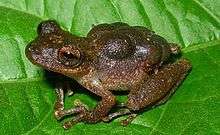Flectonotus
Flectonotus is a genus of frogs of the family Hemiphractidae.[1][2] They are found on the Andes of northeastern Colombia and adjacent Venezuela as well as in Trinidad and Tobago.[1][3]
| Flectonotus | |
|---|---|
 | |
| Flectonotus pygmaeus | |
| Scientific classification | |
| Kingdom: | Animalia |
| Phylum: | Chordata |
| Class: | Amphibia |
| Order: | Anura |
| Family: | Hemiphractidae |
| Genus: | Flectonotus Miranda-Ribeiro, 1920 |
| Type species | |
| Nototrema pygmaeum Boettger, 1893 | |
| Species | |
|
2 species (see text) | |
Taxonomy
The genus has been considered to include Fritziana, but the latter genus was recognized again in 2011.[1][3] The former Flectonotus consisted of two geographically disjunctive components, one from northern South America (=Flectonotus, as understood today) and the other from southeastern Brazil (now Fritziana).[3] The distinctiveness of these taxa is now well established and based on both molecular, behavioural, and morphological characters.[1][3]
Species
There are two Flectonotus species:[1][2]
- Flectonotus fitzgeraldi (Parker, 1934)
- Flectonotus pygmaeus (Boettger, 1893)
gollark: Yes, with a command to provide part of its source code.
gollark: <@509849474647064576> can make a discord bot these days.
gollark: I'm can grammar.
gollark: <@!345300752975003649> <@!337621533369303042>
gollark: Great, great.
References
- Frost, Darrel R. (2018). "Flectonotus Miranda-Ribeiro, 1926". Amphibian Species of the World: an Online Reference. Version 6.0. American Museum of Natural History. Retrieved 11 March 2018.
- "Hemiphractidae". AmphibiaWeb: Information on amphibian biology and conservation. [web application]. Berkeley, California: AmphibiaWeb. 2015. Retrieved 5 August 2015.
- Duellman, William E.; Jungfer, Karl-Heinz; Blackburn, David C. (2011). "The phylogenetic relationship of geographically separated "Flectonotus" (Anura: Hemiphractidae), as revealed by molecular, behavioral, and morphological data". Phyllomedusa. 10 (1): 15–29. doi:10.11606/issn.2316-9079.v10i1p15-29.
This article is issued from Wikipedia. The text is licensed under Creative Commons - Attribution - Sharealike. Additional terms may apply for the media files.